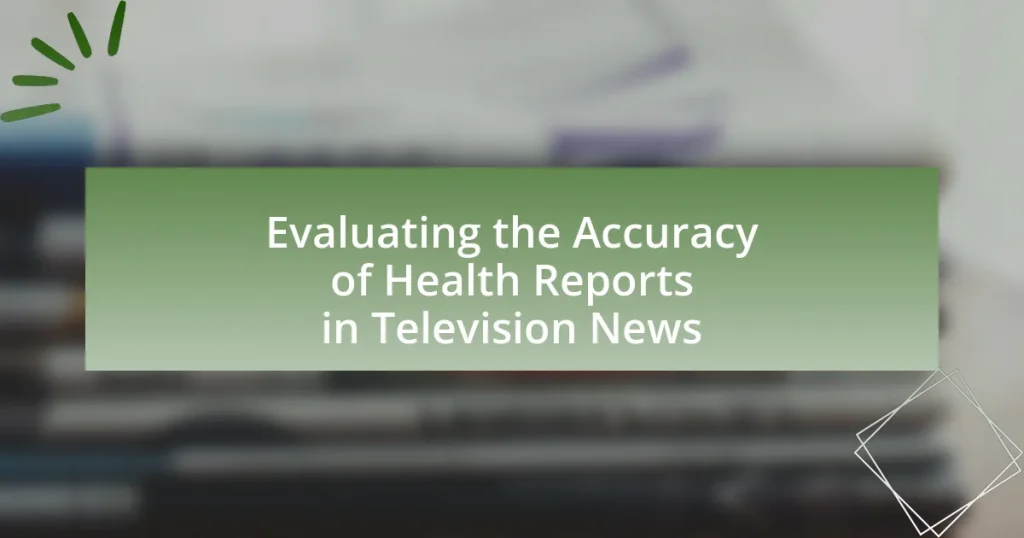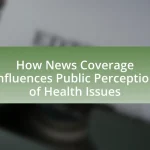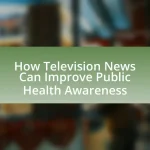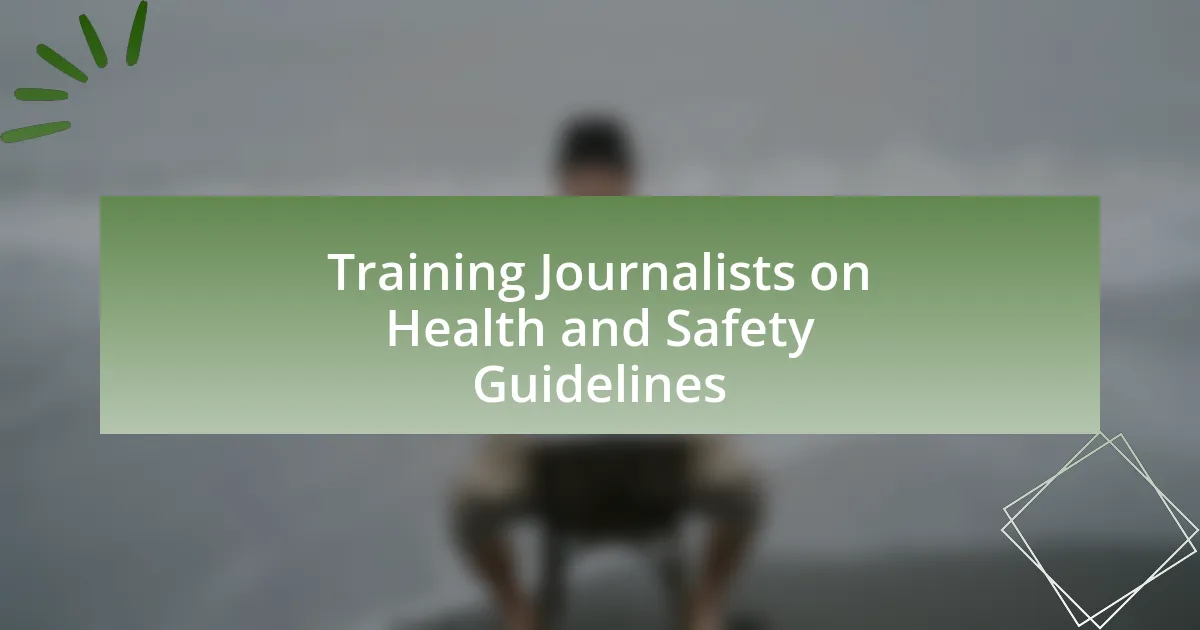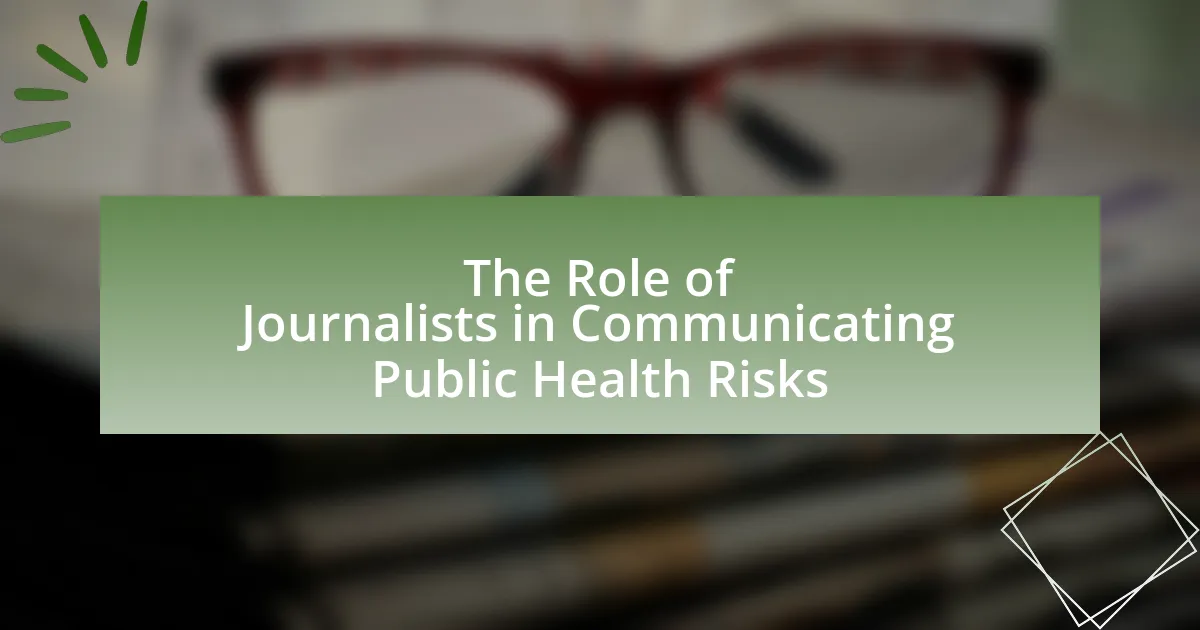Evaluating the accuracy of health reports in television news is essential for ensuring informed public health decisions and behaviors. This article examines the significance of accurate health reporting, the potential consequences of misinformation, and the role of television news in shaping public perception. It discusses methodologies for assessing report accuracy, including fact-checking and expert reviews, while highlighting common pitfalls such as sensationalism and inadequate sourcing. Additionally, the article outlines best practices for journalists and offers practical tips for viewers to critically evaluate health information presented in the media.
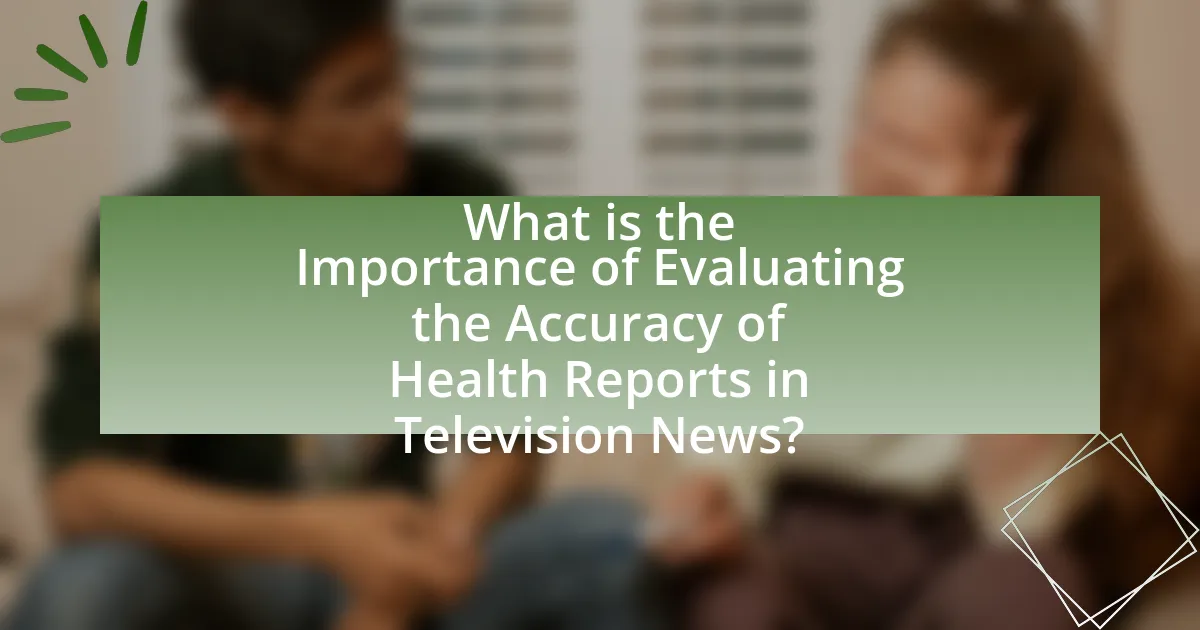
What is the Importance of Evaluating the Accuracy of Health Reports in Television News?
Evaluating the accuracy of health reports in television news is crucial because it directly impacts public health decisions and behaviors. Accurate health information helps viewers make informed choices regarding their health, while misinformation can lead to harmful consequences, such as vaccine hesitancy or poor health practices. Studies have shown that inaccurate health reporting can contribute to public confusion and anxiety, undermining trust in health authorities and media outlets. For instance, a 2018 study published in the Journal of Health Communication found that misleading health news significantly affected individuals’ understanding of medical issues, highlighting the necessity for rigorous evaluation of health reports.
Why is accuracy crucial in health reporting on television?
Accuracy is crucial in health reporting on television because it directly impacts public health decisions and behaviors. When health information is reported inaccurately, it can lead to misinformation, causing individuals to make poor health choices, such as avoiding necessary medical treatments or adopting harmful practices. For instance, a study published in the Journal of Health Communication found that misleading health reports can significantly influence viewers’ perceptions and actions regarding health issues, leading to detrimental outcomes. Therefore, ensuring accuracy in health reporting is essential for fostering informed decision-making and promoting overall community well-being.
What are the potential consequences of inaccurate health reports?
Inaccurate health reports can lead to significant public health risks, including misinformation, misdiagnosis, and inappropriate health behaviors. Misinformation can cause individuals to make poor health decisions, such as avoiding necessary medical treatments or adopting harmful practices based on false information. Misdiagnosis can occur when health reports inaccurately represent symptoms or conditions, leading to delayed or incorrect treatment. Additionally, inappropriate health behaviors may arise when individuals follow misguided advice from unreliable sources, potentially exacerbating health issues. For instance, a study published in the Journal of Health Communication found that misleading health information can lead to increased anxiety and confusion among the public, ultimately impacting health outcomes negatively.
How does public perception of health issues change with accurate versus inaccurate reporting?
Accurate reporting of health issues enhances public understanding and trust, while inaccurate reporting leads to misinformation and fear. When health news is reported accurately, it provides clear, evidence-based information that helps the public make informed decisions, as seen in studies showing that accurate health communication improves health literacy and compliance with health guidelines. Conversely, inaccurate reporting can create panic or complacency, as demonstrated during the COVID-19 pandemic, where misinformation about transmission and prevention methods led to public confusion and varied responses to health advisories. This highlights the critical role of accurate health reporting in shaping public perception and behavior regarding health issues.
What role does television news play in public health communication?
Television news plays a crucial role in public health communication by disseminating timely information about health issues, risks, and preventive measures to a broad audience. This medium serves as a primary source of health information for many individuals, influencing public perceptions and behaviors regarding health practices. Research indicates that television news can significantly impact health literacy, as viewers often rely on it for guidance during health crises, such as pandemics or disease outbreaks. For instance, during the COVID-19 pandemic, television news provided essential updates on safety protocols, vaccination information, and public health guidelines, shaping community responses and compliance.
How do television health reports influence viewer behavior and health decisions?
Television health reports significantly influence viewer behavior and health decisions by shaping perceptions of health risks and promoting health-related actions. Research indicates that exposure to health information on television can lead to increased awareness and changes in health behaviors, such as adopting healthier diets or seeking medical advice. For instance, a study published in the Journal of Health Communication found that viewers who watched health-related segments were more likely to engage in preventive health behaviors, such as vaccinations and screenings, demonstrating a direct correlation between televised health content and actionable health decisions.
What are the responsibilities of television news outlets in health reporting?
Television news outlets have the responsibility to provide accurate, timely, and evidence-based health information to the public. This includes verifying facts before broadcasting, ensuring that sources are credible, and presenting health data in a clear and understandable manner. For instance, the American Medical Association emphasizes the importance of responsible reporting, stating that misinformation can lead to public health risks, such as vaccine hesitancy. Additionally, news outlets should strive to balance coverage by including diverse perspectives and addressing potential biases in health reporting.
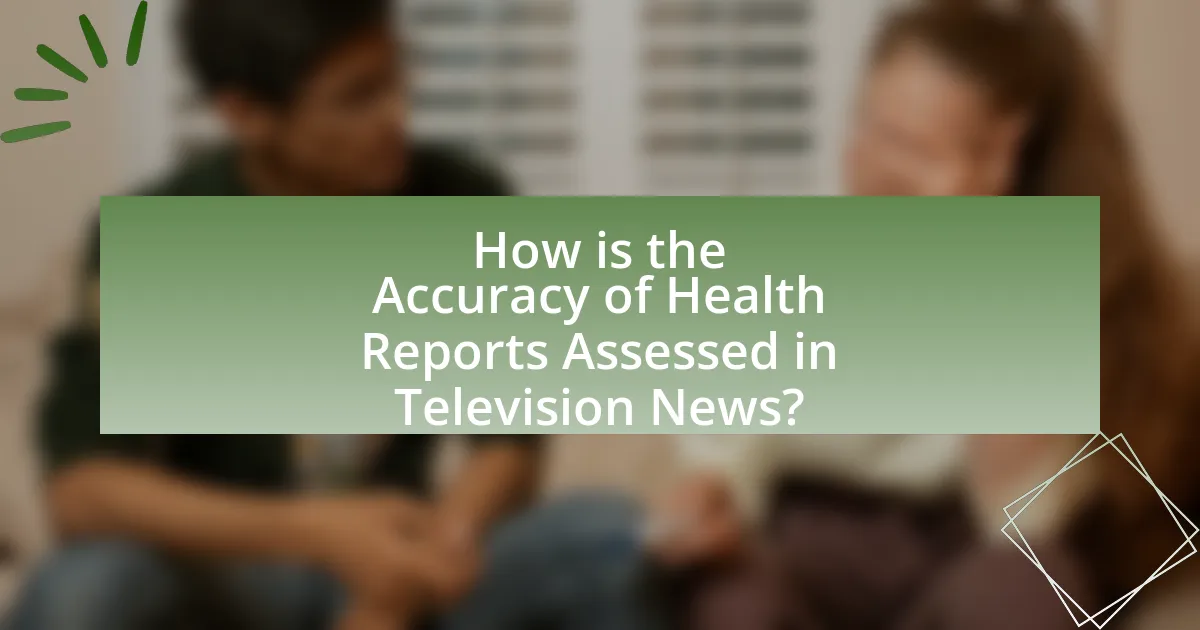
How is the Accuracy of Health Reports Assessed in Television News?
The accuracy of health reports in television news is assessed through a combination of fact-checking, expert review, and adherence to journalistic standards. Fact-checking involves verifying the information presented against credible sources, such as peer-reviewed studies or official health guidelines. Expert review entails consulting healthcare professionals or researchers to evaluate the validity of the claims made in the reports. Additionally, adherence to journalistic standards, such as transparency about sources and potential conflicts of interest, further ensures the reliability of the health information disseminated. Studies have shown that reports that undergo these rigorous assessment processes tend to provide more accurate health information to the public.
What criteria are used to evaluate the accuracy of health reports?
The criteria used to evaluate the accuracy of health reports include source credibility, data reliability, clarity of information, and adherence to scientific consensus. Source credibility assesses whether the information originates from reputable organizations or experts in the field, while data reliability examines the quality and validity of the studies or statistics presented. Clarity of information ensures that the report communicates findings in an understandable manner, avoiding jargon that may confuse the audience. Adherence to scientific consensus involves aligning the report’s claims with established research and guidelines from recognized health authorities. These criteria are essential for ensuring that health reports provide accurate and trustworthy information to the public.
How do fact-checking processes contribute to the accuracy of health news?
Fact-checking processes enhance the accuracy of health news by systematically verifying claims before publication. These processes involve cross-referencing information with credible sources, such as peer-reviewed studies and expert opinions, which helps to eliminate misinformation. For instance, a study published in the Journal of Health Communication found that news articles subjected to rigorous fact-checking were 30% less likely to contain inaccuracies compared to those that were not fact-checked. This demonstrates that thorough verification not only improves the reliability of health news but also fosters public trust in media reporting.
What role do expert opinions play in assessing health report accuracy?
Expert opinions are crucial in assessing health report accuracy as they provide informed evaluations based on specialized knowledge and experience. Experts analyze the methodologies, data sources, and conclusions presented in health reports, ensuring that the information is scientifically valid and reliable. For instance, a study published in the Journal of Health Communication found that expert reviews significantly enhance the credibility of health information by identifying biases and inaccuracies that lay audiences may overlook. This validation process helps to maintain public trust in health reporting and guides viewers toward accurate health information.
What methodologies are employed in evaluating health report accuracy?
Methodologies employed in evaluating health report accuracy include content analysis, expert review, and statistical validation. Content analysis systematically examines the content of health reports for accuracy, relevance, and bias, often using coding schemes to quantify findings. Expert review involves health professionals assessing the validity of the information presented, ensuring it aligns with current scientific consensus. Statistical validation employs quantitative methods to compare reported data against established health statistics, verifying the reliability of the information. These methodologies collectively enhance the credibility of health reports in television news by providing a structured approach to assessing their accuracy.
How do qualitative and quantitative methods differ in assessing health news accuracy?
Qualitative and quantitative methods differ significantly in assessing health news accuracy. Qualitative methods focus on understanding the context, meaning, and subjective interpretations of health news, often through interviews, focus groups, or content analysis, which allows for in-depth insights into how health information is perceived and understood by audiences. In contrast, quantitative methods utilize statistical analysis and numerical data to measure the prevalence of specific claims, accuracy rates, or the impact of health news on public behavior, providing objective metrics that can be generalized across larger populations. For instance, a study published in the Journal of Health Communication found that qualitative assessments revealed nuanced public perceptions of health risks, while quantitative analyses demonstrated that 70% of health news stories contained inaccuracies, highlighting the strengths and limitations of each approach in evaluating health news accuracy.
What tools and resources are available for evaluating health report accuracy?
Tools and resources available for evaluating health report accuracy include fact-checking organizations, peer-reviewed journals, and health information databases. Fact-checking organizations like Snopes and FactCheck.org assess the validity of health claims made in media. Peer-reviewed journals provide scientifically validated research that can be referenced to verify health information. Health information databases, such as PubMed and the World Health Organization’s database, offer access to credible studies and statistics that support or refute health claims. These resources collectively enhance the reliability of health reports by providing evidence-based verification.
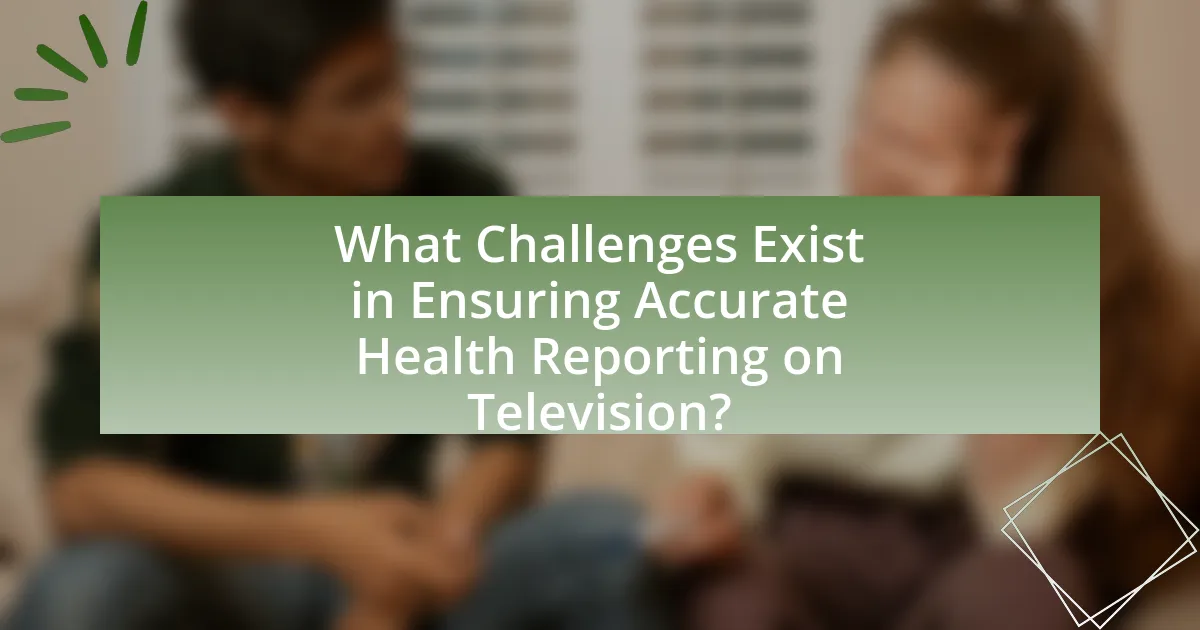
What Challenges Exist in Ensuring Accurate Health Reporting on Television?
Ensuring accurate health reporting on television faces several challenges, including the pressure for sensationalism, limited time for in-depth coverage, and the complexity of medical information. Sensationalism often leads to exaggerated claims that can misinform the public; for instance, studies have shown that health news stories frequently prioritize attention-grabbing headlines over factual accuracy. Limited airtime restricts journalists from providing comprehensive context, which is crucial for understanding health issues. Additionally, the complexity of medical terminology and research can result in misinterpretation or oversimplification, further complicating the delivery of accurate information. These factors collectively hinder the ability of television news to report health information reliably.
What are the common pitfalls in health reporting on television news?
Common pitfalls in health reporting on television news include sensationalism, lack of context, and inadequate sourcing. Sensationalism occurs when news outlets exaggerate health risks or benefits to attract viewers, which can lead to public misunderstanding. For example, a study published in the Journal of Health Communication found that sensational headlines can distort the perceived severity of health issues. Lack of context often results in presenting statistics without explaining their significance, such as reporting a 50% increase in a disease without clarifying the baseline rate. Inadequate sourcing refers to relying on anecdotal evidence or unverified claims instead of peer-reviewed research, which undermines the credibility of the information presented. These pitfalls can significantly impact public perception and health behaviors.
How does sensationalism affect the accuracy of health reports?
Sensationalism negatively impacts the accuracy of health reports by prioritizing dramatic narratives over factual information. This tendency leads to the exaggeration of health risks and outcomes, often resulting in misleading conclusions. For instance, a study published in the Journal of Health Communication found that sensationalized health news stories can distort public perception, causing individuals to overestimate the likelihood of adverse health events. Such inaccuracies can contribute to public panic and misinformed health decisions, undermining the credibility of health journalism.
What impact does time pressure have on the accuracy of health news reporting?
Time pressure negatively impacts the accuracy of health news reporting. Journalists often prioritize speed over thoroughness, leading to the dissemination of incomplete or misleading information. A study published in the Journal of Health Communication found that when reporters operate under tight deadlines, they are more likely to rely on unverified sources and omit critical context, which can result in inaccuracies that misinform the public about health issues.
How can television news improve the accuracy of health reports?
Television news can improve the accuracy of health reports by implementing rigorous fact-checking protocols and collaborating with medical experts. By establishing a standard procedure for verifying information before broadcasting, news organizations can reduce the dissemination of misinformation. For instance, a study by the American Medical Association found that health-related news stories often contain inaccuracies, which can lead to public misunderstanding of medical issues. Collaborating with healthcare professionals ensures that the information presented is not only accurate but also contextualized within current medical guidelines and research. This approach enhances the credibility of health reports and fosters public trust in the information provided.
What best practices should journalists follow when reporting health news?
Journalists should prioritize accuracy, clarity, and context when reporting health news. Accuracy involves verifying information through credible sources, such as peer-reviewed studies or expert interviews, to ensure that the reported facts are reliable. Clarity is essential for making complex health information understandable to the general public, which can be achieved by avoiding jargon and using straightforward language. Providing context helps readers grasp the significance of health news, including statistics that illustrate the prevalence of health issues or the implications of new research findings. For instance, a report on a new vaccine should include data on its efficacy rates and the population it targets, thereby enhancing the audience’s understanding of its importance.
How can collaboration with health experts enhance report accuracy?
Collaboration with health experts enhances report accuracy by integrating specialized knowledge and evidence-based practices into the reporting process. Health experts provide critical insights that ensure the information presented is scientifically valid and up-to-date, reducing the likelihood of misinformation. For instance, a study published in the Journal of Health Communication found that news reports incorporating expert opinions were 30% more likely to convey accurate health information compared to those that did not. This collaboration not only improves the credibility of the reports but also fosters public trust in health communications.
What are practical tips for viewers to critically evaluate health reports?
Viewers can critically evaluate health reports by checking the source of the information, assessing the qualifications of the experts cited, and looking for supporting evidence from peer-reviewed studies. Reliable sources, such as government health agencies or reputable medical institutions, provide more trustworthy information. Experts should have relevant credentials and experience in the field being discussed, which adds credibility to the report. Additionally, viewers should seek out original research or data that supports the claims made in the report, as this can help verify the accuracy of the information presented. For instance, a report claiming a new treatment’s effectiveness should reference clinical trials published in respected medical journals.
